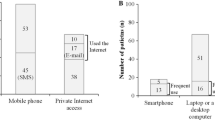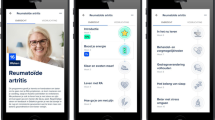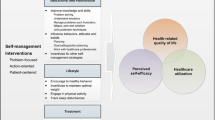Abstract
Purpose of Review
To review the self-management of rheumatoid arthritis (RA) using mobile applications.
Recent Findings
Recent research supports that self-management not only can be an empowering behavior for an individual but also has been shown to improve health outcomes in RA. Mobile health applications are growing in popularity and adoption. Emerging evidence supports that using a mobile application for RA self-management may reduce disease activity and improve health outcomes.
Summary
This review discusses mobile applications designed to improve self-management of RA as well as applications not specific to RA that also may be useful for self-management in this population. Future research should focus on the efficacy of mobile apps for health outcomes and ways to improve the adoption of and adherence to mobile apps in individuals with RA.

Similar content being viewed by others
References
Papers of particular interest, published recently, have been highlighted as: • Of importance •• Of major importance
Wurmser Y. US time spent with mobile 2019. EMarketer. Last modified May. 2019.
Aitken M, Clancy B, Nass D. The growing value of digital health. IQVIA Instit Human Data Sci. 2017;1–76.
Perry B, Geoghegan C, Lin L, McGuire FH, Nido V, Grabert B, et al. Patient preferences for using mobile technologies in clinical trials. Contemp Clin Trials Commun. 2019;15:100399 193 participants responded to a survey about experience with technology; Participants preferred a mobile clinical trial over a traditional trial; Mobile clinical trials were preferred due to convenience, and greater data collection capabilities.
American Medical Association. Integration of mobile health applications and devices into practice. 2017. URL: https://policysearch.ama-assn.org/policyfinder/ detail/mobile%20health?uri=%2FAMADoc%2FHOD-480.943.xml.
Bodenheimer T, Lorig K, Holman H, Grumbach K. Patient self-management of chronic disease in primary care. JAMA. 2002;288(19):2469–75.
Barlow J, Wright C, Sheasby J, Turner A, Hainsworth J. Self-management approaches for people with chronic conditions: a review. Patient Educ Couns. 2002;48(2):177–87.
Marks R, Allegrante JP. A review and synthesis of research evidence for self-efficacy-enhancing interventions for reducing chronic disability: implications for health education practice (part II). Health Promot Pract. 2005;6(2):148–56.
Chao DY, Lin TM, Ma WY. Enhanced self-efficacy and behavioral changes among patients with diabetes: cloud-based mobile health platform and mobile app service. JMIR Diab. 2019;4(2):e11017.
Holman H, Lorig K. Patient self-management: a key to effectiveness and efficiency in care of chronic disease. Public Health Rep. 2004;119(3):239–43.
Katz PP. Use of self-management behaviors to cope with rheumatoid arthritis stressors. Arthritis Care Res: Off J Am Coll Rheumatol. 2005;53(6):939–49.
Luo W, Zhang X, Ren K. Self-management in patients with rheumatoid arthritis. Rheumatoid Arthritis. 2020. IntechOpen.
Battafarano DF, Ditmyer M, Bolster MB, Fitzgerald JD, Deal C, Bass AR, et al. 2015 American College of Rheumatology workforce study: supply and demand projections of adult rheumatology workforce, 2015–2030. Arthritis Care Res. 2018;70(4):617–26.
Holman H, Lorig K. Patients as partners in managing chronic disease: partnership is a prerequisite for effective and efficient health care. 2000.
Anekwe TD, Rahkovsky I. Self-management: a comprehensive approach to management of chronic conditions. Am J Public Health. 2018;108(S6):S430–6.
Coleman S, Briffa NK, Carroll G, Inderjeeth C, Cook N, McQuade J. A randomised controlled trial of a self-management education program for osteoarthritis of the knee delivered by health care professionals. Arthritis Res Ther. 2012;14(1):R21.
Panagioti M, Richardson G, Small N, Murray E, Rogers A, Kennedy A, et al. Self-management support interventions to reduce health care utilisation without compromising outcomes: a systematic review and meta-analysis. BMC Health Serv Res. 2014;14(1):356.
Alessa T, Abdi S, Hawley MS, de Witte L. Mobile apps to support the self-management of hypertension: systematic review of effectiveness, usability, and user satisfaction. JMIR mHealth uHealth. 2018;6(7):e10723.
Mollard E, Michaud K. Mobile apps for rheumatoid arthritis: opportunities and challenges. Rheum Dis Clin. 2019;45(2):197–209.
Mollard E, Michaud K. A mobile app with optical imaging for the self-management of hand rheumatoid arthritis: pilot study. JMIR mHealth uHealth. 2018;6(10):e12221.
Potdar R, Thomas A, DiMeglio M, Mohiuddin K, Djibo DA, Laudanski K, et al. Access to internet, smartphone usage, and acceptability of mobile health technology among cancer patients. Support Care Cancer. 2020;12:1–7.
Vogels EA. Millennials stand out for their technology use, but older generations also embrace digital life. Pew Res Cent. 2019.
Colls J, Lee YC, Xu C, Corrigan C, Lu F, Marquez-Grap G, Murray M, Suh DH, Solomon DH. Patient adherence with a smartphone app for patient-reported outcomes in rheumatoid arthritis. Rheumatology. 2020. 78 participants with RA collected patient-reported outcomes via mobile app over 6 months; Participants adhered well to the mobile app; Participants with better disease control and older age were more likely to adhere to the app.
Luo D, Wang P, Lu F, Elias J, Sparks JA, Lee YC. Mobile apps for individuals with rheumatoid arthritis: a systematic review. JCR: J Clin Rheumatol. 2019;25(3):133–41.
Grainger R, Townsley HR, Ferguson CA, Riley FE, Langlotz T, Taylor WJ. Patient and clinician views on an app for rheumatoid arthritis disease monitoring: function, implementation and implications. Int J Rheum Dis. 2020. An app for RA was developed by researchers in partnership with patients and health care providers; Informed by the views of stakeholders, the app received high usability scores; People with RA and health care providers have positive opinions about mobile apps, and realistic views of the potential challenges.
Caplan L, Wolfe F, Michaud K, Quinzanos I, Hirsh JM. Strong association of health literacy with functional status among rheumatoid arthritis patients: a cross-sectional study. Arthritis Care Res. 2014;66(4):508–14.
Khanna S, Jaiswal KS, Gupta B. Managing rheumatoid arthritis with dietary interventions. Front Nutr. 2017;4:52.
Bearne LM, Sekhon M, Grainger R, La A, Shamali M, Amirova A, et al. Smartphone apps targeting physical activity in people with rheumatoid arthritis: systematic quality appraisal and content analysis. JMIR mHealth uHealth. 2020;8(7):e18495.
Katz P, Margaretten M, Gregorich S, Trupin L. Physical activity to reduce fatigue in rheumatoid arthritis: a randomized controlled trial. Arthritis Care Res. 2018;70(1):1–0 Use of wearable pedometers decreased fatigue and increased physical activity in participants with RA.
Lazard AJ, Brennen JS, Troutman Adams E, Love B. Cues for increasing social presence for mobile health app adoption. J Health Commun. 2020;25(2):136–49.
Willis E. Patients’ self-efficacy within online health communities: facilitating chronic disease self-management behaviors through peer education. Health Commun. 2016;31(3):299–307.
des Bordes JK, Gonzalez E, Lopez-Olivo MA, Shethia M, Nayak P, Suarez-Almazor ME. Assessing information needs and use of online resources for disease self-management in patients with rheumatoid arthritis: a qualitative study. Clin Rheumatol. 2018;37(7):1791–7 Qualitative study (n = 20) focusing on how individuals use Facebook to gather information and self-manage RA; Participants were willing to join a Facebook community; Gathering information on RA was the main priority.
van Uden-Kraan CF, Drossaert CH, Taal E, Shaw BR, Seydel ER, van de Laar MA. Empowering processes and outcomes of participation in online support groups for patients with breast cancer, arthritis, or fibromyalgia. Qual Health Res. 2008 Mar;18(3):405–17.
Qudah B, Luetsch K. The influence of mobile health applications on patient-healthcare provider relationships: a systematic, narrative review. Patient Educ Couns. 2019;102(6):1080–9.
Austin L, Sharp CA, van der Veer SN, Machin M, Humphreys J, Mellor P, et al. Providing ‘the bigger picture’: benefits and feasibility of integrating remote monitoring from smartphones into the electronic health record: findings from the Remote Monitoring of Rheumatoid Arthritis (REMORA) study. Rheumatology. 2020;59(2):367–78 An app using remote monitoring was co-designed using qualitative interview with RA stakeholders; Usability and acceptability of the app were demonstrated among users; Participants felt the information gathered improved their RA clinical care and gathered more detailed information on their RA.
Lee Y, Lu F, Colls J, Murray M, Suh D, Song J, Lee J, Dunlop D, Solomon D. Outcomes of a mobile app to monitor patient reported outcomes in rheumatoid arthritis: a randomized controlled trial in Arthritis Care and Research (Hoboken). Arthritis Rheumatol. 2019;71(suppl 10). https://acrabstracts.org/abstract/effect-of-a-mobile-app-to-monitor-patient-reported-outcomes-in-rheumatoid-arthritis-a-randomized-controlled-trial/. Accessed 31 Aug 2020. 191 participants used a mobile app to collect PRO; The app did not improve disease activity or patient satisfaction; Participants strongly adhered to the intervention.
Grainger R, Townsley HR, Ferguson CA, Riley FE, Langlotz T, Taylor WJ. Patient and clinician views on an app for rheumatoid arthritis disease monitoring: function, implementation and implications. Int J Rheum Dis. 2020.
Wong PK. Medication adherence in patients with rheumatoid arthritis: why do patients not take what we prescribe? Rheumatol Int. 2016;36(11):1535–42.
Sciascia S, Radin M, Cecchi I, Di Nunzio P, Buccarano N, Di Gregorio F, et al. Tailoring tofacitinib oral therapy in rheumatoid arthritis: the TuTORApp—a usability study. Int J Environ Res Public Health. 2020;17(10):3469.
Zhao P, Yoo I, Lancey R, Varghese E. Mobile applications for pain management: an app analysis for clinical usage. BMC Med Inform Decis Making. 2019;19(1):1.
Orji R, Moffatt K. Persuasive technology for health and wellness: state-of-the-art and emerging trends. Health Inform J. 2018;24(1):66–91.
Geuens J, Swinnen TW, Westhovens R, de Vlam K, Geurts L, Abeele VV. A review of persuasive principles in mobile apps for chronic arthritis patients: opportunities for improvement. JMIR mHealth uHealth. 2016;4(4):e118.
Linardon J, Fuller-Tyszkiewicz M. Attrition and adherence in smartphone-delivered interventions for mental health problems: a systematic and meta-analytic review. J Consult Clin Psychol. 2020;88(1):1–13.
Druce KL, Dixon WG, McBeth J. Maximizing engagement in mobile health studies: lessons learned and future directions. Rheum Dis Clin. 2019;45(2):159–72.
Trifan A, Oliveira M, Oliveira JL. Passive sensing of health outcomes through smartphones: systematic review of current solutions and possible limitations. JMIR mHealth uHealth. 2019;7(8):e12649.
Michaud K, Vrijens B, Tousset E, Pedro S, Schumacher R, Dasic G, et al. Real-world adherence to oral methotrexate measured electronically in patients with established rheumatoid arthritis. ACR Open Rheumatol. 2019;1(9):560–70.
Crouthamel M, Quattrocchi E, Watts S, Wang S, Berry P, Garcia-Gancedo L, et al. Using a ResearchKit smartphone app to collect rheumatoid arthritis symptoms from real-world participants: feasibility study. JMIR mHealth uHealth. 2018;6(9):e177.
Author information
Authors and Affiliations
Corresponding author
Ethics declarations
Conflict of Interest
The authors declare that they have no conflict of interest.
Human and Animal Rights and Informed Consent
This article does not contain any studies with human or animal subjects performed by any of the authors.
Additional information
Publisher’s Note
Springer Nature remains neutral with regard to jurisdictional claims in published maps and institutional affiliations.
Topical Collection on Rheumatoid Arthritis
Rights and permissions
About this article
Cite this article
Mollard, E., Michaud, K. Self-Management of Rheumatoid Arthritis: Mobile Applications. Curr Rheumatol Rep 23, 2 (2021). https://doi.org/10.1007/s11926-020-00968-7
Accepted:
Published:
DOI: https://doi.org/10.1007/s11926-020-00968-7




